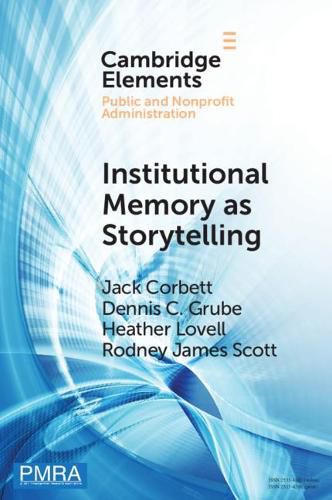Readings Newsletter
Become a Readings Member to make your shopping experience even easier.
Sign in or sign up for free!
You’re not far away from qualifying for FREE standard shipping within Australia
You’ve qualified for FREE standard shipping within Australia
The cart is loading…






How do bureaucracies remember? The conventional view is that institutional memory is static and singular, the sum of recorded files and learned procedures. There is a growing body of scholarship that suggests contemporary bureaucracies are failing at this core task. This Element argues that this diagnosis misses that memories are essentially dynamic stories. They reside with people and are thus dispersed across the array of actors that make up the differentiated polity. Drawing on four policy examples from four sectors (housing, energy, family violence and justice) in three countries (the UK, Australia and New Zealand), this Element argues that treating the way institutions remember as storytelling is both empirically salient and normatively desirable. It is concluded that the current conceptualisation of institutional memory needs to be recalibrated to fit the types of policy learning practices required by modern collaborative governance.
$9.00 standard shipping within Australia
FREE standard shipping within Australia for orders over $100.00
Express & International shipping calculated at checkout
How do bureaucracies remember? The conventional view is that institutional memory is static and singular, the sum of recorded files and learned procedures. There is a growing body of scholarship that suggests contemporary bureaucracies are failing at this core task. This Element argues that this diagnosis misses that memories are essentially dynamic stories. They reside with people and are thus dispersed across the array of actors that make up the differentiated polity. Drawing on four policy examples from four sectors (housing, energy, family violence and justice) in three countries (the UK, Australia and New Zealand), this Element argues that treating the way institutions remember as storytelling is both empirically salient and normatively desirable. It is concluded that the current conceptualisation of institutional memory needs to be recalibrated to fit the types of policy learning practices required by modern collaborative governance.